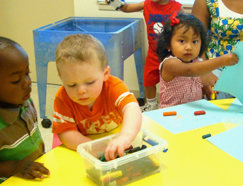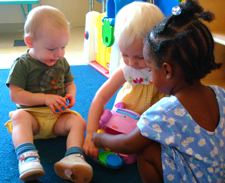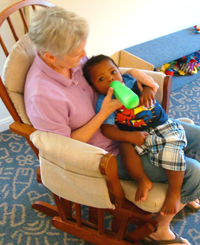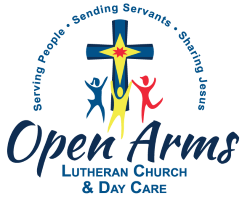Twos
Ages: 2 - 3 years
The purpose of this program is to prepare children for a preschool experience while building on the self-help skills, social skills, following of directions and problem solving skills they were introduced to in our Toddler Program. 'Striving for independence' is a way to describe the children in this class! As they are learning to make their mark on the world the teacher will be introducing and teaching routines and expectations. You will see this in circle time, lining up, cleaning up, moving from one activity to another, problem solving, and using materials.
Learning activities at this age are child-initiated and teacher-supplemented. Learning through child-initiated play is very important to the development of your child's brain, and provides the building blocks for how the child approaches learning tasks in future years.
The toilet training process continues, and is a major focus, in this room. Remember that children are ready for toilet training at different ages and will let you know when to start. In order to progress to the next classroom, your child will need to be fully toilet trained. Hands-on learning is still the key to this program! Children are 'learning to learn,' and are doing so largely through their senses. Sensory exploration will be a part of several art, math and science experiences.
Hands-on learning is still the key to this program! Children are 'learning to learn,' and are doing so largely through their senses. Sensory exploration will be a part of several art, math and science experiences.
Children in this program will have circle time each day. They will be developing language and learning to express themselves! Children this age are learning to talk about what is happening around them. They are trying to make sense of their world and figure out how it all works together. We will provide lots of experiences for them that will help them sort this out!
Toddlers
Ages: 15 months - 2 years
This program will build on the skills learned in the Infant room. The days will be organized by a planned theme of the week that includes circle time, stories, Jesus time, art, songs, movement, sensory experiences and other hands-on activities. Talking, listening and singing with these children is essential for their language development.
As part of their day, the children will continue to learn and practice self-help skills and social relationships. It is important for children to learn to wash and dry their hands, find their shoes, put away their toys and learn to make choices. While doing all these things your child will be building adult and peer relationships. We want them to develop positive friendships and interactions with others. They will continue to learn how to follow simple directions.The children start the process of learn how to share materials. They will also learn about self-control and how to join activities.

Infants
Ages: 6 weeks - 15 months
(Note: 15 months is the approximate transition age.)
Infants need a loving and consistent environment to thrive in. They need to know the same caring person is there when they are in distress and can read their cues to tell if they are hungry, wet or tired. They need the right amount of stimulation and the freedom to explore the world! They also need adults who encourage them and take pleasure in their skills and accomplishments. We will give all that and more to your infant every day.
A daily written lesson plan will assist the teachers in introducing activities that will help the babies reach their developmental milestones: reaching, grasping, passing objects from hand to hand, smiling, sitting, crawling, standing and walking! They will develop meaningful language....okay, we might not know what they are truly saying, but it is meaningful communication! We follow your child's daily schedule for eating, sleeping and playing. It is important for us to have excellent communication with you as your child grows so we all know when their habits begin to change and how that is affecting their day. We want to get your child outside in the fresh air each day so always send them with the appropriate clothing.
We follow your child's daily schedule for eating, sleeping and playing. It is important for us to have excellent communication with you as your child grows so we all know when their habits begin to change and how that is affecting their day. We want to get your child outside in the fresh air each day so always send them with the appropriate clothing.
It is your responsibility to send "ready to go" formula in bottles each day as well as their baby food. As your child develops, we will introduce the sippy cup, and, with your direction, introduce milk. As your child begins table foods we will introduce foods at snack time. Parents supply diapers, wipes, and cremes.
Infants less than 12 months of age will sleep in cribs and we will supply the crib sheets. Parents may provide their own sheets if sensitivity exists. After they celebrate their first birthday, children will be introduced to sleeping on a cot.
Each day, a report will be sent home tracking feedings, diapering, sleeping, mood and any special things that happened. Your child's primary caregiver will fill that out and be your main contact person. She will build a special relationship with your child. When your child is ready to transition into the Ones Room, their primary caregiver will help them build new relationships with new caregivers.
For those over 12 months of age, caregivers will help children to learn habits and skills they will need for the toddler room. They will be introduced to "big kid" chairs, sitting at a table, and eating with spoons. Around 15 months, children will move to the Toddler room, and having these skills under their belts will make it a lot easier.
Page 2 of 2

